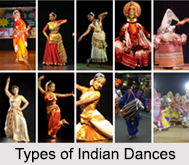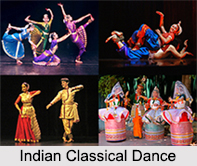 Types of Indian Dances reflect the rich ethos of the subcontinent. With their sheer intricacies, the different types of Indian dances bring out the innermost feelings and emotion, whilst depicting the cultural aspects of the age-old civilization of India. Like all other aspects of life, the dance forms of India are also varied and different. There are many types of dance forms in India, from those which are deeply religious in content to those which are performed on small occasions.
Types of Indian Dances reflect the rich ethos of the subcontinent. With their sheer intricacies, the different types of Indian dances bring out the innermost feelings and emotion, whilst depicting the cultural aspects of the age-old civilization of India. Like all other aspects of life, the dance forms of India are also varied and different. There are many types of dance forms in India, from those which are deeply religious in content to those which are performed on small occasions.Classification of Types of Indian Dances
Based on the style, dash, intricacies and elan, Indian dance can be broadly classified into four types like, Classical Indian dance, Indian Folk dance, Tribal dance and the Fusion dance.
Indian Classical Dances: Indian Classical dance is also known as the traditional Indian dance which has abundant forms and takes human figure as its basic medium of expressions. Dance performed inside the temple chamber, imperial courts along with music are classified as classical dance. The foundation of the conventions and methodical movements and types of this dance lies in an ancient book of dance, music and drama called ‘Natyashastra’. The Indian classical dance style is unique in terms of movement, grace, style and elan. The major Indian classical dances are as follows:
• Bharatnatyam: Bharatnatyam is one of the oldest forms of classical dance which has its origin in Tamil Nadu. It is inspired from the sculptures of the ancient temple of Chidambaram. Bharatnatyam is considered to be a mystic manifestation of the metaphysical element of fire in the human body. It is a solo dance with two aspects, the graceful feminine movements and also the masculine motion.
• Kathakali: Kathakali originated in Kerala. It is a classical Indian dance-drama known for its attractive make-up of characters, detailed costumes, gestures and well-defined body movements. It is considered to be a combination of dance, music, playing of instruments and drama.
 • Kathak: Kathak is a dance form which has its origin in Northern India. It has the influences of Bhakti movement, Persian dance and Central Asian Dance. This dance form traces its origins to the nomadic bards of ancient northern India, known as Kathaks, or storytellers.
• Kathak: Kathak is a dance form which has its origin in Northern India. It has the influences of Bhakti movement, Persian dance and Central Asian Dance. This dance form traces its origins to the nomadic bards of ancient northern India, known as Kathaks, or storytellers.• Kuchipudi: Kuchipudi is a dance form of Andhra Pradesh. It has derived its name from a village in Krishna District where the Brahmins used to practice this art. It has bright and quick movements. One of the major attractions is where the dancer has to dance on the brass plate with two diyas in her hand while balancing a small vessel containing water on her head.
• Mohiniyattam: Mohiniyattam, also known as dance of enchantress, is a major art form in Kerala performed only by women. It has its influences from Bharatnatyam and Kathakali. It is basically a drama in dance and poetry.
• Manipuri: Manipuri dance as the name suggests is the foremost dance form of Manipur. Its main theme is Raslila. The conventional Manipuri dance style symbolises delicate, poetic and poised movements. Its facial and bodily movements are restrained.
For more, visit the link below: